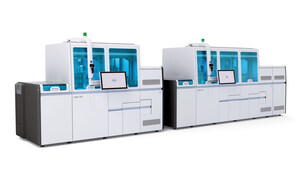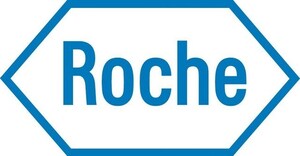
- Rules out Alzheimer's pathology in early stages to enhance diagnostic pathway efficiency
- Provides new opportunity to broaden access and improve referral quality
- Features as part of Roche's growing portfolio designed to further shape Alzheimer's diagnostic pathways
INDIANAPOLIS, Oct. 13, 2025 /PRNewswire/ -- Roche (SIX: RO, ROG; OTCQX: RHHBY) today announced that the United States Food and Drug Administration (FDA) has cleared its Elecsys pTau181 test, the only blood-based biomarker (BBM) test indicated as an aid in the initial assessment for Alzheimer's disease and other causes of cognitive decline in the primary-care setting. The Elecsys pTau181 test is intended for patients ages 55 and older presenting with signs, symptoms or complaints of cognitive decline. It measures phosphorylated Tau (pTau) 181 protein in human plasma, a key biomarker for Alzheimer's pathology, including amyloid plaque and tau aggregate pathology.
Developed in collaboration with Eli Lilly and Company, this minimally invasive test provides clinicians with information that can help identify patients in early stages of cognitive decline who are unlikely to have Alzheimer's-related amyloid pathology. The result should be interpreted in conjunction with other clinical information.
"By bringing Alzheimer's blood-based biomarker testing into primary care, we can help patients and their clinicians get answers sooner to support them earlier in their journeys," said Brad Moore, President and CEO of Roche Diagnostics North America. "This milestone reflects Roche's leadership in diagnostics and our commitment to expanding access to innovative testing for patients and their clinicians."
Alzheimer's is complex, with multiple pathologies impacting more than 7 million Americans.1 Unfortunately, 92% of patients with mild cognitive impairment (early-stage symptomatic disease) go undiagnosed and are therefore unable to explore whether therapeutic intervention is possible.1
Until now, Alzheimer's biomarker testing has largely been limited to specialty settings, such as neurology. By enabling use in primary care, the Elecsys pTau181 test has the potential to significantly broaden patient access to minimally invasive testing and helps preserve specialist resources. Primary care clinicians can better guide appropriate referrals so neurologists can focus on the patients most likely to need advanced evaluation and treatment.
With more than 4,500 Roche instruments already installed in clinical laboratories across the United States, health systems and providers are well positioned to rapidly integrate the Elecsys pTau181 test into their existing infrastructure. This scale makes it easier for laboratories to bring minimally invasive Alzheimer's tests closer to patients and clinicians nationwide.
Elecsys pTau181 is the only FDA-cleared, blood-based Alzheimer's test indicated as an aid in the initial assessment for Alzheimer's and other causes of cognitive decline in the primary-care setting. The performance was evaluated in a multicenter, non-interventional clinical study in 312 participants. Results demonstrated that in an early disease-stage, low-prevalence population reflective of primary-care setting, Elecsys pTau181 could rule out Alzheimer's pathology with a 97.9% negative predictive value (NPV). Fully automated on Roche's installed base of instruments, Elecsys pTau181 allows laboratories to integrate testing quickly and at scale – creating new opportunities to broaden access and reduce delays for patients and their providers.
With FDA clearance, the Elecsys pTau181 test may provide information that can help healthcare providers and systems:
- Enable early-disease-stage assessment of patients with cognitive complaints by providing information that may help aiding clinicians in ruling out Alzheimer's-related amyloid pathology
- Better integrate primary care into the Alzheimer's diagnosis pathway and expand testing availability
- Improve referral quality by guiding physicians' decisions on patient referrals
- Help preserve neurologists' resources for patients with the greatest need
- Potentially reduce the use of more invasive and costly procedures such as positron emission tomography (PET) and cerebrospinal fluid (CSF) testing, thus improving efficiency and cost-effectiveness across the healthcare system
The clearance of Elecsys pTau181 is an important milestone in Roche's ongoing work to transform Alzheimer's diagnostics. Looking ahead, Roche is advancing a comprehensive portfolio that has the potential to further shape diagnostic pathways and support earlier, more accurate detection of neurological diseases. This work reflects Roche's commitment to lead with science in developing transformational solutions that both improve patient outcomes and simplify laboratory operations.
In addition to FDA clearance in the United States, Roche recently received CE Mark certification in Europe for the Elecsys pTau181 test, making it the first In Vitro Diagnostic Regulation (IVDR)-certified blood test to help rule out Alzheimer's-associated amyloid pathology. Together, these milestones highlight Roche's ability to expand access to minimally invasive Alzheimer's tests across global healthcare systems – enabling earlier detection, reducing unnecessary confirmatory testing, and supporting patients and caregivers with greater clarity on their diagnostic journey.
About Roche in Alzheimer's
With more than two decades of leadership in Alzheimer's research and diagnostics, Roche offers one of the broadest portfolios of diagnostic assays — from CSF and blood-based tests to digital solutions — aimed at more effectively detecting, diagnosing and monitoring the disease. The company also provides a wide range of research-use-only (RUO) assays that advance scientific understanding and support future innovation. These efforts complement Roche's pipeline of investigational medicines targeting different pathways, types and stages of Alzheimer's disease.
Roche believes that making a meaningful impact requires both scientific innovation and collaboration across healthcare, policy and the broader Alzheimer's community.
About Roche
Founded in 1896 in Basel, Switzerland, as one of the first industrial manufacturers of branded medicines, Roche has grown into the world's largest biotechnology company and the global leader in in-vitro diagnostics. The company pursues scientific excellence to discover and develop medicines and diagnostics for improving and saving the lives of people around the world. We are a pioneer in personalized healthcare and want to further transform how healthcare is delivered to have an even greater impact. To provide the best care for each person, we partner with many stakeholders and combine our strengths in Diagnostics and Pharma with data insights from the clinical practice.
For over 125 years, sustainability has been an integral part of Roche's business. As a science-driven company, our greatest contribution to society is developing innovative medicines and diagnostics that help people live healthier lives. Roche is committed to the Science Based Targets initiative and the Sustainable Markets Initiative to achieve net zero by 2045.
Genentech, in the United States, is a wholly owned member of the Roche Group. Roche is the majority shareholder in Chugai Pharmaceutical, Japan.
For more information, please visit www.roche.com.
All trademarks used or mentioned in this release are protected by law.
For Further Information
Roche Diagnostics U.S. Media Relations
[email protected]
Jen Dial
1-463-867-0232
[email protected]
Amy Lynn
1-317-750-7811
[email protected]
References
- Biomed Central (BMC). Alzheimer's Research & Therapy:Expected and diagnosed rates of mild cognitive impairment and dementia in the U.S. Medicare population: observational analysis. Accessed October 2025.
SOURCE Roche Diagnostics








Share this article